
Journal of Fisheries
Scope & Guideline
Exploring the depths of fisheries science.
Introduction
Aims and Scopes
- Fish Biology and Ecology:
Research on the biological aspects of fish species, including their growth, reproduction, feeding habits, and population dynamics, aimed at understanding their ecological roles and responses to environmental changes. - Aquaculture Techniques and Innovations:
Studies focusing on the development and optimization of aquaculture practices, including breeding, nutrition, and health management of cultured species, to improve productivity and sustainability. - Fisheries Management and Policy:
Analysis of fishery resources, stock assessments, and the socio-economic implications of fisheries management strategies, addressing sustainability and conservation issues. - Environmental Impact and Conservation:
Research on the effects of environmental factors on fish populations and habitats, including pollution, climate change, and conservation strategies for endangered species. - Technological Advancements in Fisheries:
Exploration of new technologies and methods for improving fishery practices, including genetic studies, biotechnological applications, and innovative farming techniques.
Trending and Emerging
- Molecular and Genetic Studies:
An increasing focus on molecular biology and genetic research, including DNA barcoding and genetic diversity studies aimed at understanding species identification and conservation genetics. - Sustainable Aquaculture Practices:
A trend towards investigating sustainable aquaculture practices, including the use of alternative feeds, integrated farming, and minimizing environmental impacts, which are critical for future food security. - Impact of Climate Change:
Research addressing the effects of climate change on aquatic ecosystems, fish behavior, and fisheries productivity is becoming more prevalent, reflecting global concerns over environmental changes. - Health Management in Aquaculture:
There is a growing emphasis on fish health management, including disease prevention and treatment strategies, as aquaculture expands and faces new health challenges. - Socio-Economic Aspects of Fisheries:
An emerging trend in the journal is the exploration of socio-economic dimensions of fisheries, including livelihood studies, gender roles, and community impacts, which are essential for integrated fisheries management.
Declining or Waning
- Traditional Fishing Practices:
Research related to traditional fishing methods and their socio-cultural implications is observed to be less frequent, possibly due to a shift towards modern, sustainable practices and technologies. - Extensive Aquaculture Systems:
There seems to be a waning interest in studies focused solely on extensive aquaculture systems, as the emphasis shifts towards more intensive and integrated farming approaches that promise higher efficiency and sustainability. - Generalized Stock Assessments:
There is a noticeable decrease in generic stock assessment studies, with a growing preference for more detailed, species-specific assessments that incorporate advanced methodologies and technologies.
Similar Journals

FISHERY BULLETIN
Navigating the Future of Aquatic Resource ManagementFISHERY BULLETIN, published by the NATL MARINE FISHERIES SERVICE SCIENTIFIC PUBL OFFICE, serves as a pivotal resource in the field of Aquatic Science, offering valuable insights into fisheries science and management since its inception in 1881. With an Open Access model, the journal ensures that researchers, professionals, and students can access cutting-edge research freely, fostering greater collaboration and innovation within the community. The journal boasts a substantial history of publication, encompassing articles from 1979 to 2024, and has achieved a respectable Q3 Quartile ranking in its category for 2023, highlighting its influence amid its peers. It currently ranks #161 out of 247 in the Scopus database for Agricultural and Biological Sciences, with a 35th percentile ranking, indicative of the quality and relevance of its contributions. The FISHERY BULLETIN stands out as an essential platform for disseminating significant findings and advancing knowledge relevant to sustainable fisheries and marine resource management, making it an indispensable tool for academic researchers and industry practitioners alike.
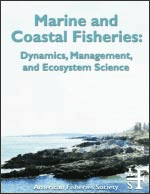
Marine and Coastal Fisheries
Unlocking insights for the preservation of marine life.Marine and Coastal Fisheries, published by Wiley, is a leading open access journal that has been dedicated to advancing the field of fisheries science since its inception in 2009. With an esteemed Q1 ranking in Aquatic Science and a Q2 ranking in Ecology, Evolution, Behavior and Systematics as of 2023, the journal actively contributes to the understanding and management of marine and coastal ecosystems.
This journal serves a diverse audience ranging from researchers and practitioners to students, providing a platform for high-quality peer-reviewed articles that address contemporary challenges in fisheries management and conservation. With a commitment to global accessibility, Marine and Coastal Fisheries promotes the dissemination of scientific knowledge to enhance sustainable practices in marine environments, making it an essential resource for those invested in the health of aquatic ecosystems. To explore the latest research and insights, visit the journal's website and engage with the thriving community of marine science professionals.

SU URUNLERI DERGISI
Connecting Researchers to Elevate Aquatic SciencesSU URUNLERI DERGISI, published by EGE UNIVERSITY, FACULTY OF FISHERIES, is a premier open-access journal dedicated to advancements in aquatic sciences and fisheries research. With the ISSN 1300-1590 and E-ISSN 2148-3140, this journal has been committed to disseminating high-quality research since 1984, offering valuable insights into the management and conservation of aquatic resources. Based in BORNOVA-IZMIR, Turkey, the journal serves as a crucial platform for researchers, professionals, and students who are actively engaged in the study of fishery practices, aquaculture, and related environmental challenges. As a resource for innovative and impactful studies, SU URUNLERI DERGISI encourages submissions that foster collaboration and advancement within the aquatic research community.
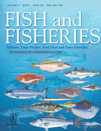
FISH AND FISHERIES
Championing conservation through rigorous scientific dialogue.FISH AND FISHERIES is a premier academic journal published by Wiley, dedicated to advancing knowledge in the fields of aquatic science, ecology, and oceanography. With an impressive impact reflected in its 2023 categorization in the Q1 quartile across multiple disciplines—including Aquatic Science and Management, Monitoring, Policy and Law—it serves as an essential resource for researchers, professionals, and students alike. This journal includes rigorous, peer-reviewed articles that address the multifaceted aspects of fish biology, conservation, and sustainable fisheries management. The journal's Scopus rankings further validate its significance, with top positions in Earth and Planetary Sciences, and its commitment to fostering scientific dialogue in an era where the oceans and aquatic ecosystems face unprecedented challenges. Despite not being an Open Access journal, FISH AND FISHERIES remains a vital platform for innovative research that informs policy and drives stewardship of fish populations and their habitats.

REVIEWS IN FISH BIOLOGY AND FISHERIES
Exploring the intricacies of fish biology and sustainable fisheries.Reviews in Fish Biology and Fisheries, published by Springer, is a prestigious journal dedicated to advancing our understanding of fish biology and the principles underpinning fisheries science. With an impact factor reflective of its high citation rate and its recognition as a Q1 category journal in Aquatic Science, it ranks impressively at #9 out of 247 in the Scopus database, placing it within the top 4% of its field. Established in 1991, this journal serves as a crucial platform for researchers, professionals, and students alike, offering comprehensive reviews and insights that foster innovation and collaboration in aquatic research. Although it is not available as an open-access publication, its rigorous peer-review process ensures the dissemination of quality research that informs policy and practices in fisheries management globally. With a diverse range of topics covered, the journal is an essential resource for anyone aiming to deepen their knowledge and impact in the dynamic fields of fish biology and fisheries.
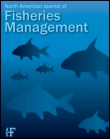
NORTH AMERICAN JOURNAL OF FISHERIES MANAGEMENT
Championing Rigorous Scholarship in Fisheries ScienceNORTH AMERICAN JOURNAL OF FISHERIES MANAGEMENT, published by WILEY, is a premier peer-reviewed journal dedicated to advancing the science and management of freshwater and marine fisheries across North America. With an ISSN of 0275-5947 and E-ISSN of 1548-8675, this esteemed journal has been a crucial platform for innovative research from its inception in 1981 through to its anticipated evolution in 2024. The journal is recognized for its rigorous scholarship, evidenced by its impact in various categories with a Q2 ranking in Aquatic Science, Ecology, and Ecology, Evolution, Behavior and Systematics, as well as a Q3 ranking in the domain of Management, Monitoring, Policy and Law. Researchers and practitioners can access cutting-edge findings that address critical environmental challenges and promote sustainable fisheries management. With a consistent focus on ecological implications and policy development, this journal serves as an essential resource for those aiming to make a significant impact in fisheries science and management.

AFRICAN JOURNAL OF MARINE SCIENCE
Advancing knowledge of Africa's vibrant marine ecosystems.AFRICAN JOURNAL OF MARINE SCIENCE is a premier academic journal dedicated to advancing the field of aquatic sciences and ecological studies, published by Taylor & Francis Ltd. Established in 2003 and based in South Africa, this journal provides a vital platform for researchers, professionals, and students interested in the diverse and dynamic marine ecosystems of Africa. With an impressive impact factor reflected in its Q2 quartile ranking in both Aquatic Science and Ecology, Evolution, Behavior and Systematics categories, the journal showcases innovative research that addresses pressing environmental challenges. Open access options facilitate broad dissemination of knowledge, ensuring that cutting-edge findings are accessible to all stakeholders in the marine research community. As it converges towards its impressive milestone year of 2024, the AFRICAN JOURNAL OF MARINE SCIENCE serves as an essential resource for fostering scientific discourse and collaboration across the continent and beyond.
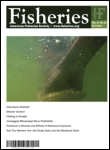
FISHERIES
Innovating solutions for global fishery management.FISHERIES, published by WILEY, stands at the forefront of aquatic science and nature conservation, providing a vital platform for researchers and practitioners to share their findings and contribute to the sustainable management of global fishery resources. With an impressive impact factor and recognition within its field, the journal is currently ranked Q2 in both Aquatic Science and Nature and Landscape Conservation categories as of 2023, indicating its significant influence and quality of research dissemination. Covering a broad scope of topics from aquatic ecosystems to conservation strategies, FISHERIES facilitates cross-disciplinary discourse essential for understanding the ecological and socioeconomic aspects of fisheries. As the journal converges its years of operations from 1976 to 2024, it continues to adapt to emerging challenges in the field, making it an invaluable resource for professionals, researchers, and students alike who are dedicated to advancing knowledge and practices in sustainable fisheries management.
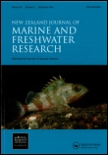
NEW ZEALAND JOURNAL OF MARINE AND FRESHWATER RESEARCH
Championing Ecological Research for Tomorrow's ChallengesNEW ZEALAND JOURNAL OF MARINE AND FRESHWATER RESEARCH, published by Taylor & Francis Ltd, stands as a distinguished platform for the dissemination of innovative research in the realms of aquatic science and ecology. With an ISSN of 0028-8330 and E-ISSN 1175-8805, this journal has been curating significant scientific contributions since its inception in 1967, continuing through to 2024. Recognized in the Q2 category across multiple relevant fields—including Aquatic Science, Ecology, and Water Science—this journal ranks notably in Scopus, with a 74th percentile for Ecology, Evolution, Behavior and Systematics, highlighting its impact and relevance within the scientific community. Though not an open-access publication, its rigorous peer-reviewed articles offer insights that resonate with researchers, professionals, and students who are passionate about advancing our understanding of freshwater and marine ecosystems. By fostering a collaborative space for ecological and environmental inquiries, the NEW ZEALAND JOURNAL OF MARINE AND FRESHWATER RESEARCH is essential for those aiming to contribute to the vital conversations around biodiversity, conservation, and sustainable management of aquatic resources.

FISHERY TECHNOLOGY
Bridging research and practice for a sustainable fishing industry.FISHERY TECHNOLOGY is a distinguished journal dedicated to the advancement of knowledge in the field of fisheries science and technology. Published by the Society of Fisheries Technologists, India, this journal serves as a vital platform for researchers, professionals, and students across the globe to disseminate innovative findings and methodologies related to fishery practices, aquatic ecosystem management, and sustainable fishing technologies. With its ISSN 0015-3001, FISHERY TECHNOLOGY seeks to uphold the standards of scholarly research and contributes significantly to the discourse surrounding marine resources and their sustainable utilization. Although currently not available in an open-access format, the journal remains committed to reaching a wide audience through reputable distribution channels. The journal is characterized by its goal to bridge theoretical research with practical applications, thereby impacting both the scientific community and the fishing industry. Engage with FISHERY TECHNOLOGY to keep abreast of the latest developments and contribute to the sustainable management of aquatic resources.